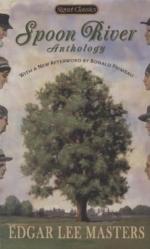|
This section contains 3,029 words (approx. 11 pages at 300 words per page) |

|
SOURCE: An introduction to The New Spoon River, The Macmillan Company, 1968, pp. xvii-xxvi.
In the following excerpt, Barnstone examines the misanthropy inherent in Masters's portrait of small-town America.
When Spoon River Anthology first appeared in 1915, it was greeted as a new form of literary expression and as a breakthrough in its candid treatment of small-town mores. It received phenomenal public acclaim, greater than any volume of poems since Hiawatha. Yet, because of its exposure of rural life, it also provoked a nationwide moral controversy.1 Looking back, it is strange to recall how once an angry young man's poems could have so pleased and outraged an American public, how Edgar Lee Masters' verbal missiles against a philistine target achieved such a noisy success. By 1961 Spoon River Anthology had gone through seventy editions, had been translated into at least eight foreign tongues, and had been made into an American play...
|
This section contains 3,029 words (approx. 11 pages at 300 words per page) |

|


